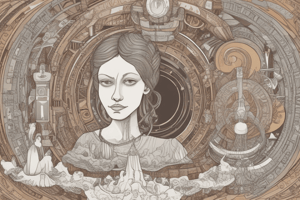Podcast
Questions and Answers
How do shared symbols constitute a culture, and what is the condition for their sharing?
How do shared symbols constitute a culture, and what is the condition for their sharing?
Symbols must be shared to constitute a culture, but they don’t have to be shared by every single member of a social group.
What is the characteristic of cultures in terms of their integration, and what are the consequences of this characteristic?
What is the characteristic of cultures in terms of their integration, and what are the consequences of this characteristic?
Cultures are usually not integrated wholes, leading to division, conflict, fragmentation, and hierarchy of sets of cultural beliefs.
How do culturalist perspectives approach debates like the pro-life vs pro-abortion discussion?
How do culturalist perspectives approach debates like the pro-life vs pro-abortion discussion?
From a culturalist perspective, this is not simply about individual options, but social configurations, with conflicts between symbolic codes and narratives.
What is the relationship between the systems of symbols constituting culture and concrete social behaviors?
What is the relationship between the systems of symbols constituting culture and concrete social behaviors?
What is the nature of division and conflict in cultures, and how can it be understood?
What is the nature of division and conflict in cultures, and how can it be understood?
How does the concept of culture relate to the idea of wholes or parts?
How does the concept of culture relate to the idea of wholes or parts?
What does the inconsistency between attitudes and behavior reflect, according to the concept of internal cultural schisms?
What does the inconsistency between attitudes and behavior reflect, according to the concept of internal cultural schisms?
What is the distinction between people's values and symbolic schemes, according to the social and cultural construction of meaning?
What is the distinction between people's values and symbolic schemes, according to the social and cultural construction of meaning?
What is the primary focus of the academic project of sociology, as described in the context of historical and scientific foundations of sociology?
What is the primary focus of the academic project of sociology, as described in the context of historical and scientific foundations of sociology?
What is the key aspect of the discussion of scientific truth claims in the social sciences, as described in the context of historical and scientific foundations of sociology?
What is the key aspect of the discussion of scientific truth claims in the social sciences, as described in the context of historical and scientific foundations of sociology?
What is the notion of internal cultural schisms an example of, in the context of the social and cultural construction of meaning?
What is the notion of internal cultural schisms an example of, in the context of the social and cultural construction of meaning?
What is the Enlightenment paradigm based on, and what type of knowledge is considered valid?
What is the Enlightenment paradigm based on, and what type of knowledge is considered valid?
What is the core idea behind the concept of Universalism in the Enlightenment paradigm?
What is the core idea behind the concept of Universalism in the Enlightenment paradigm?
What is the main assumption behind the notion of Progress in the Enlightenment paradigm?
What is the main assumption behind the notion of Progress in the Enlightenment paradigm?
What is the central idea behind the concept of Individualism in the Enlightenment paradigm?
What is the central idea behind the concept of Individualism in the Enlightenment paradigm?
What is the key principle behind the concept of Toleration in the Enlightenment paradigm?
What is the key principle behind the concept of Toleration in the Enlightenment paradigm?
What is the main idea behind the concept of Freedom in the Enlightenment paradigm?
What is the main idea behind the concept of Freedom in the Enlightenment paradigm?
What is the central assumption behind the concept of Uniformity of human nature in the Enlightenment paradigm?
What is the central assumption behind the concept of Uniformity of human nature in the Enlightenment paradigm?
What is the main idea behind the concept of Secularism in the Enlightenment paradigm?
What is the main idea behind the concept of Secularism in the Enlightenment paradigm?
Study Notes
The Social and Cultural Construction of Meaning
- Cultures are composed of shared symbols, but not all members of a social group need to share them.
- Cultures are typically not integrated wholes, instead, they are characterized by:
- Division and conflict
- Fragmentation and hierarchy of sets of cultural beliefs
Cultures as Wholes or Parts?
- Cultures are not unified systems, but rather a collection of conflicting symbolic codes and narratives.
- Example: The pro-life vs pro-abortion debate is a reflection of conflicting social configurations and symbolic codes, rather than individual opinions.
- Reflection point: How natural is division and conflict, fragmentation, and hierarchy in cultures? In what senses and to what extent?
The Distance between Symbolic Systems and Social Behaviors
- There is a gap between the systems of symbols constituting culture and concrete social behaviors, which allows for change and makes social life "creative" and "unpredictable".
- This distance can lead to inconsistencies between attitudes and behavior, reflecting internal cultural schisms.
- People's values tend to be public, while their symbolic schemes tend to be private and latent.
The Enlightenment and the Birth of Social Science
The Enlightenment Paradigm
- Science: scientific knowledge based on the experimental method is the foundation of all human knowledge.
- Universalism: reason and science are universal constants, producing general laws that govern the universe without exception.
- Progress: the natural and social condition of human beings can be improved through the application of science and reason, leading to increasing happiness and well-being.
Key Principles of the Enlightenment Paradigm
- Individualism: the individual is the starting point of all knowledge and action, and individual reason cannot be subjected to a higher authority.
- Toleration: all people are equal, and beliefs of other races or civilizations are not inherently inferior to those of European Christianity.
- Freedom: opposition to traditional constraints on beliefs, trade, communication, social interaction, sexuality, and ownership of property.
- Uniformity of human nature: the principal characteristics of human beings are always and everywhere the same.
- Secularism: a form of virulent anti-clericalism, opposing religious authority and stressing the need for a 'secular' knowledge free of religion.
Studying That Suits You
Use AI to generate personalized quizzes and flashcards to suit your learning preferences.
Related Documents
Description
This quiz covers the social and cultural construction of meaning, including cultures as wholes or parts, and the historical and scientific foundations of sociology, specifically the Enlightenment paradigm.




